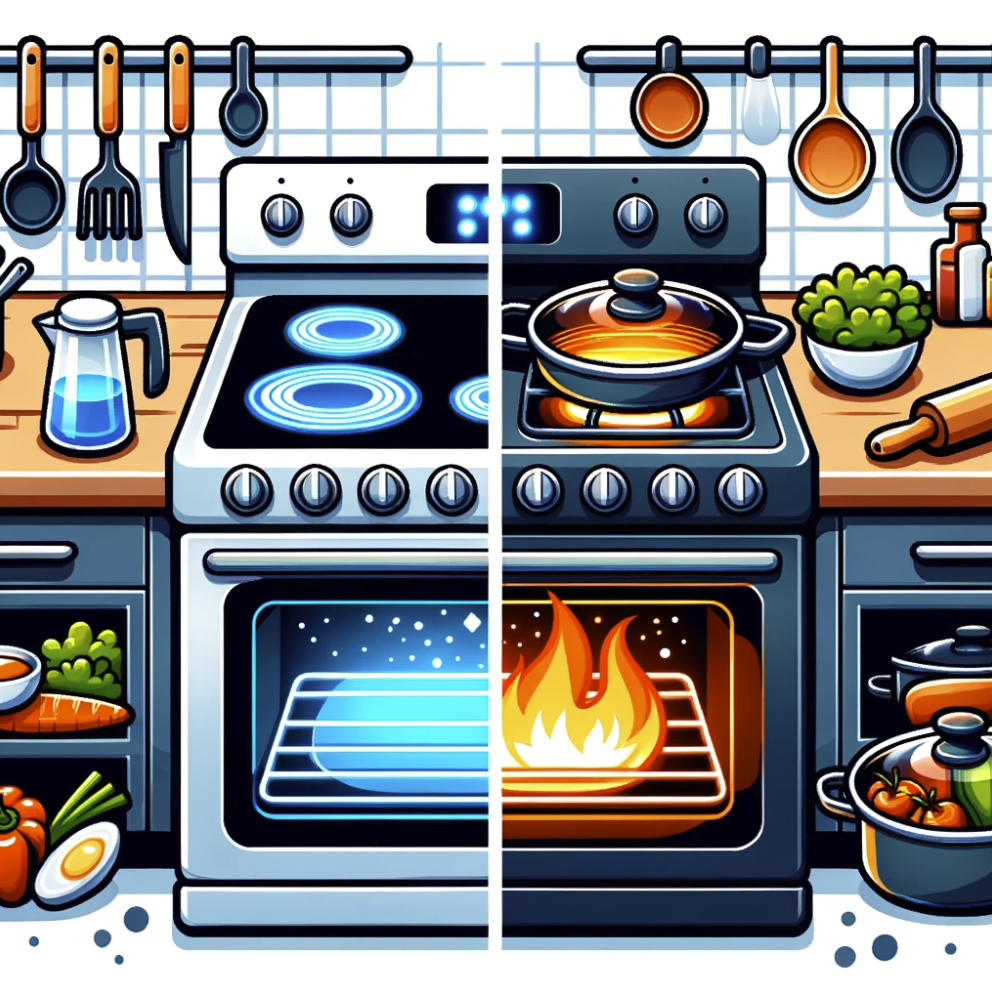When it comes to choosing a stove for your kitchen, one of the most important decisions you’ll need to make is whether to go with an electric or gas model.
Both options have their own set of advantages and disadvantages, and understanding these differences can help you make an informed decision that suits your cooking needs and preferences.
In this article, we will explore the key factors to consider when choosing between electric and gas stoves, providing you with the insights you need to make the right choice for your kitchen.
Electric vs. Gas Stoves
Electric Stoves:
- Heated using electrical resistance.
- Smooth cooktop surface.
- Heats up and cools down slower.
- Often more energy-efficient.
Gas Stoves:
- Use natural gas or propane as fuel.
- Open flame cooking.
- Immediate heat adjustment.
- Preferred by many professional chefs for precise control.
Table of Contents
1. Energy Efficiency
Energy efficiency is an important consideration for many homeowners, as it not only helps reduce utility bills but also contributes to a more sustainable lifestyle.
When comparing electric and gas stoves in terms of energy efficiency, gas stoves come out on top.
According to the U.S. Department of Energy, gas stoves are about three times more energy-efficient than electric stoves.
This is because gas stoves provide instant heat and allow for precise temperature control, resulting in less wasted energy.
On the other hand, electric stoves take longer to heat up and cool down, which can lead to energy wastage.
Additionally, electric stoves rely on electricity generated from power plants, which may not be as environmentally friendly as natural gas.
However, it’s worth noting that advancements in technology have led to the development of more energy-efficient electric stoves in recent years.

2. Cooking Performance
When it comes to cooking performance, both electric and gas stoves have their own strengths and weaknesses.
Gas stoves are known for their instant heat and precise temperature control, allowing for quick adjustments while cooking.
This makes them ideal for tasks that require rapid changes in heat levels, such as sautéing or stir-frying.
Electric stoves, on the other hand, provide more even and consistent heat distribution, which can be advantageous for tasks that require slow and steady cooking, such as simmering or baking.
Electric stoves also offer the option of smooth glass or ceramic cooktops, which are easier to clean and maintain compared to gas stoves with their grates and burners.
3. Safety
Safety is a crucial factor to consider when choosing a stove, especially if you have young children or pets in your household.
Gas stoves pose a higher risk of fire hazards due to the open flame, which can be accidentally left on or cause gas leaks if not properly maintained.
However, modern gas stoves are equipped with safety features such as automatic shut-off valves and flame sensors to mitigate these risks.
Electric stoves, on the other hand, eliminate the risk of open flames, making them inherently safer in terms of fire hazards.
However, they do come with their own set of safety concerns.
The smooth glass or ceramic cooktops of electric stoves can retain heat even after they are turned off, posing a burn risk.
Additionally, the exposed heating elements of coil-style electric stoves can also cause burns if touched accidentally.

4. Installation and Cost
When it comes to installation and cost, gas stoves tend to be more expensive upfront compared to electric stoves.
This is because gas stoves require a gas line to be installed in your kitchen, which can involve additional plumbing work and associated costs.
However, gas stoves are generally cheaper to operate in the long run due to the lower cost of natural gas compared to electricity.
Electric stoves, on the other hand, are typically easier and cheaper to install since they only require a standard electrical outlet.
However, they tend to be more expensive to operate, especially if you live in an area with high electricity rates.
It’s important to consider both the upfront cost and long-term operating costs when making your decision.
5. Maintenance and Durability
Maintenance and durability are important factors to consider when investing in a stove for your kitchen.
Gas stoves require regular cleaning and maintenance of the burners, grates, and gas lines to ensure optimal performance and safety.
However, they are generally more durable and have a longer lifespan compared to electric stoves.
Electric stoves, on the other hand, require less maintenance since they don’t have burners or gas lines to clean.
However, the smooth glass or ceramic cooktops can be prone to scratches and cracks if not handled with care.
Additionally, the heating elements of electric stoves may need to be replaced over time, adding to the maintenance costs.
FAQs – Electric vs. Gas Stoves: What’s Right for Your Kitchen?
1. Which is cheaper to operate, electric or gas stoves?
Gas stoves are generally cheaper to operate in the long run due to the lower cost of natural gas compared to electricity.
2. Are electric stoves safer than gas stoves?
Electric stoves eliminate the risk of open flames, making them inherently safer in terms of fire hazards.
However, they have their own safety concerns such as hot glass or ceramic cooktops and exposed heating elements.
3. Do gas stoves heat up faster than electric stoves?
Yes, gas stoves heat up faster than electric stoves due to their instant heat capabilities.
4. Can I convert my electric stove to a gas stove?
Converting an electric stove to a gas stove can be a complex process and may require professional assistance.
It’s best to consult with a licensed technician or plumber to determine if it’s feasible for your specific situation.
5. Are electric stoves more environmentally friendly than gas stoves?
Gas stoves are considered more environmentally friendly than electric stoves since they rely on natural gas, which produces fewer greenhouse gas emissions compared to electricity generated from power plants.
However, advancements in technology have led to the development of more energy-efficient electric stoves in recent years.
6. Can I use the same cookware for both electric and gas stoves?
Yes, you can use the same cookware for both electric and gas stoves.
However, it’s important to note that gas stoves may require heavier cookware with flat bottoms to ensure stability on the grates.
7. Do electric stoves require a special electrical outlet?
No, electric stoves typically require a standard electrical outlet.
However, it’s important to ensure that the electrical circuit can handle the stove’s power requirements.
8. Are gas stoves more durable than electric stoves?
Gas stoves are generally more durable and have a longer lifespan compared to electric stoves.
However, proper maintenance and care are essential for both types of stoves to ensure optimal performance and longevity.
9. Can I use a gas stove during a power outage?
Yes, you can use a gas stove during a power outage as long as you have a match or lighter to ignite the burners manually.
However, it’s important to exercise caution and ensure proper ventilation when using gas appliances indoors.
10. Do electric stoves require ventilation?
Electric stoves do not produce combustion byproducts like gas stoves, so they do not require ventilation specifically for that purpose.
However, proper ventilation in the kitchen is still important to remove cooking odors, smoke, and excess heat.
11. Can I install a gas stove myself?
Gas stove installation should be done by a licensed professional to ensure safety and compliance with local building codes.
It involves connecting the stove to a gas line, which requires specialized knowledge and skills.
12. Are gas stoves more prone to leaks?
Gas stoves can pose a risk of gas leaks if not properly maintained or if there are issues with the gas line.
However, modern gas stoves are equipped with safety features such as automatic shut-off valves and flame sensors to minimize this risk.
13. Can I use cast iron cookware on electric stoves?
Yes, cast iron cookware is suitable for use on electric stoves. In fact, the even heat distribution of electric stoves can be advantageous for cooking with cast iron.
14. Do gas stoves require more ventilation than electric stoves?
Gas stoves require proper ventilation to remove combustion byproducts such as carbon monoxide.
However, both gas and electric stoves benefit from adequate ventilation in the kitchen to maintain air quality and remove cooking odors.
15. Can I use a wok on an electric stove?
Yes, you can use a wok on an electric stove. However, it’s important to choose a wok with a flat bottom to ensure stability on the smooth glass or ceramic cooktop.
Summary – Electric vs. Gas Stoves: What’s Right for Your Kitchen?
Choosing between an electric and gas stove ultimately depends on your cooking preferences, lifestyle, and budget.
Gas stoves offer instant heat, precise temperature control, and energy efficiency, making them ideal for those who enjoy quick and versatile cooking.
On the other hand, electric stoves provide even heat distribution, ease of cleaning, and safety benefits, making them suitable for those who prefer slow and steady cooking or have safety concerns.
Consider factors such as energy efficiency, cooking performance, safety, installation and cost, as well as maintenance and durability when making your decision.
It’s also worth visiting appliance showrooms or reading customer reviews to get a hands-on experience and gather insights from others who have already made the switch.


